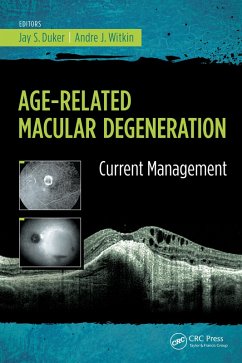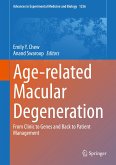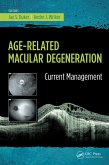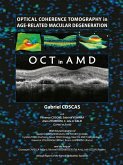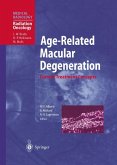102,95 €
102,95 €
inkl. MwSt.
Sofort per Download lieferbar

51 °P sammeln
102,95 €
Als Download kaufen

102,95 €
inkl. MwSt.
Sofort per Download lieferbar

51 °P sammeln
Jetzt verschenken
Alle Infos zum eBook verschenken
102,95 €
inkl. MwSt.
Sofort per Download lieferbar
Alle Infos zum eBook verschenken

51 °P sammeln
- Format: PDF
- Merkliste
- Auf die Merkliste
- Bewerten Bewerten
- Teilen
- Produkt teilen
- Produkterinnerung
- Produkterinnerung

Bitte loggen Sie sich zunächst in Ihr Kundenkonto ein oder registrieren Sie sich bei
bücher.de, um das eBook-Abo tolino select nutzen zu können.
Hier können Sie sich einloggen
Hier können Sie sich einloggen
Sie sind bereits eingeloggt. Klicken Sie auf 2. tolino select Abo, um fortzufahren.

Bitte loggen Sie sich zunächst in Ihr Kundenkonto ein oder registrieren Sie sich bei bücher.de, um das eBook-Abo tolino select nutzen zu können.
Retinal disease in general, and age-related macular degeneration (AMD) specifically, is of major interest worldwide due to the increasing aging population and the revolution in management of wet AMD over the past several years.
- Geräte: PC
- ohne Kopierschutz
- eBook Hilfe
- Größe: 17.32MB
Andere Kunden interessierten sich auch für
![Age-Related Macular Degeneration (eBook, PDF) Age-Related Macular Degeneration (eBook, PDF)]() Age-Related Macular Degeneration (eBook, PDF)59,95 €
Age-Related Macular Degeneration (eBook, PDF)59,95 €![Age-related Macular Degeneration (eBook, PDF) Age-related Macular Degeneration (eBook, PDF)]() Age-related Macular Degeneration (eBook, PDF)121,95 €
Age-related Macular Degeneration (eBook, PDF)121,95 €![Age-Related Macular Degeneration (eBook, ePUB) Age-Related Macular Degeneration (eBook, ePUB)]() Jay DukerAge-Related Macular Degeneration (eBook, ePUB)102,95 €
Jay DukerAge-Related Macular Degeneration (eBook, ePUB)102,95 €![Optical Coherence Tomography in Age-Related Macular Degeneration (eBook, PDF) Optical Coherence Tomography in Age-Related Macular Degeneration (eBook, PDF)]() Gabriel CoscasOptical Coherence Tomography in Age-Related Macular Degeneration (eBook, PDF)75,95 €
Gabriel CoscasOptical Coherence Tomography in Age-Related Macular Degeneration (eBook, PDF)75,95 €![Age-related macular degeneration (eBook, PDF) Age-related macular degeneration (eBook, PDF)]() Frank G. HolzAge-related macular degeneration (eBook, PDF)65,95 €
Frank G. HolzAge-related macular degeneration (eBook, PDF)65,95 €![Age-Related Macular Degeneration (eBook, PDF) Age-Related Macular Degeneration (eBook, PDF)]() Age-Related Macular Degeneration (eBook, PDF)81,95 €
Age-Related Macular Degeneration (eBook, PDF)81,95 €![Clinical Trials in Age-Related Macular Degeneration Treatment (eBook, PDF) Clinical Trials in Age-Related Macular Degeneration Treatment (eBook, PDF)]() Jeffrey N. WeissClinical Trials in Age-Related Macular Degeneration Treatment (eBook, PDF)113,95 €
Jeffrey N. WeissClinical Trials in Age-Related Macular Degeneration Treatment (eBook, PDF)113,95 €-
-
-
Retinal disease in general, and age-related macular degeneration (AMD) specifically, is of major interest worldwide due to the increasing aging population and the revolution in management of wet AMD over the past several years.
Dieser Download kann aus rechtlichen Gründen nur mit Rechnungsadresse in A, B, BG, CY, CZ, D, DK, EW, E, FIN, F, GR, HR, H, IRL, I, LT, L, LR, M, NL, PL, P, R, S, SLO, SK ausgeliefert werden.
Produktdetails
- Produktdetails
- Verlag: Taylor & Francis
- Seitenzahl: 176
- Erscheinungstermin: 1. Juni 2024
- Englisch
- ISBN-13: 9781040140772
- Artikelnr.: 70883222
- Verlag: Taylor & Francis
- Seitenzahl: 176
- Erscheinungstermin: 1. Juni 2024
- Englisch
- ISBN-13: 9781040140772
- Artikelnr.: 70883222
- Herstellerkennzeichnung Die Herstellerinformationen sind derzeit nicht verfügbar.
Jay S. Duker, MD is professor and chair of the Department of Ophthalmology at Tufts Medical Center and Tufts University School of Medicine and the Director of the New England Eye Center in Boston. Dr. Duker received his medical degree magna cum laude from Jefferson Medical College in Philadelphia. He completed an internal medicine internship at the Beth Israel Hospital in Boston. Dr. Duker then completed an ophthalmology residency, serving as chief resident, followed by a retina and vitreous surgery fellowship, at the Wills Eye Hospital in Philadelphia.
Dr. Duker's major research interests include imaging of the posterior segment, retinal vascular disease, and drug delivery to the posterior segment. He has pursued those interests as a coinvestigator or principal investigator of numerous studies funded by the National Institutes of Health/National Eye Institute, Massachusetts Institute of Technology, and industry, including studies of optical coherence tomography and several phase III trials. Specializing in medical and surgical diseases of the posterior segment, his surgical expertise includes macular diseases, retinal detachment, proliferative vitreoretinopathy, diabetic retinopathy, and intraocular tumors. He has published more than 180 journal articles, and he has been lead editor on 3 books and 13 book chapters. In addition, Dr. Duker lectures extensively both nationally and internationally. He is an associate editor of Ophthalmic Surgery and Laser Therapy and has served on the editorial boards of Review of Ophthalmology, Evidence-Based Eye Care, and Retina Today. He has been a reviewer for many journals, including Ophthalmology, American Journal of Ophthalmology, Archives of Ophthalmology, Ophthalmic Surgery and Lasers, Retina, and The New England Journal of Medicine, among others. Dr. Duker is the recipient of the Honor Award and Senior Honor Award from the American Academy of Ophthalmology.
Andre J. Witkin, MD was born in Waterville, Maine. He attended Dartmouth College, earning his bachelor's degree magna cum laude with high honors in biology. He earned his MD from Weill Cornell Medical College in New York City and did his ophthalmology residency at the New England Eye Center of Tufts Medical Center in Boston. Dr. Witkin then did a 2-year fellowship in retinal disease and vitreoretinal surgery at the Wills Eye Institute in Philadelphia. In 2012, he joined the ophthalmology faculty at the New England Eye Center of Tufts Medical Center as an assistant professor. Dr. Witkin has a special interest in clinical research, particularly in the field of retinal imaging. He has published more than 30 articles in peer-reviewed journals and several book chapters and has presented at more than a dozen national meetings in the field of ophthalmology. Dr. Witkin is currently the primary investigator for a number of clinical trials in macular degeneration and central serous chorioretinopathy at the New England Eye Center.
Dr. Duker's major research interests include imaging of the posterior segment, retinal vascular disease, and drug delivery to the posterior segment. He has pursued those interests as a coinvestigator or principal investigator of numerous studies funded by the National Institutes of Health/National Eye Institute, Massachusetts Institute of Technology, and industry, including studies of optical coherence tomography and several phase III trials. Specializing in medical and surgical diseases of the posterior segment, his surgical expertise includes macular diseases, retinal detachment, proliferative vitreoretinopathy, diabetic retinopathy, and intraocular tumors. He has published more than 180 journal articles, and he has been lead editor on 3 books and 13 book chapters. In addition, Dr. Duker lectures extensively both nationally and internationally. He is an associate editor of Ophthalmic Surgery and Laser Therapy and has served on the editorial boards of Review of Ophthalmology, Evidence-Based Eye Care, and Retina Today. He has been a reviewer for many journals, including Ophthalmology, American Journal of Ophthalmology, Archives of Ophthalmology, Ophthalmic Surgery and Lasers, Retina, and The New England Journal of Medicine, among others. Dr. Duker is the recipient of the Honor Award and Senior Honor Award from the American Academy of Ophthalmology.
Andre J. Witkin, MD was born in Waterville, Maine. He attended Dartmouth College, earning his bachelor's degree magna cum laude with high honors in biology. He earned his MD from Weill Cornell Medical College in New York City and did his ophthalmology residency at the New England Eye Center of Tufts Medical Center in Boston. Dr. Witkin then did a 2-year fellowship in retinal disease and vitreoretinal surgery at the Wills Eye Institute in Philadelphia. In 2012, he joined the ophthalmology faculty at the New England Eye Center of Tufts Medical Center as an assistant professor. Dr. Witkin has a special interest in clinical research, particularly in the field of retinal imaging. He has published more than 30 articles in peer-reviewed journals and several book chapters and has presented at more than a dozen national meetings in the field of ophthalmology. Dr. Witkin is currently the primary investigator for a number of clinical trials in macular degeneration and central serous chorioretinopathy at the New England Eye Center.
Dedication About the Editors Contributing Authors Preface Chapter 1 Epidemiology
Genetics
and Modifiable Risk Factors Anita Agarwal
MD Chapter 2 Pathology of Age-Related Macular Degeneration Nora M.V. Laver
MD Chapter 3 Clinical Diagnosis
Classification
and Patient Counseling Sana Nadeem
MBBS and Nadia K. Waheed
MD
MPH Chapter 4 Ancillary Testing in Age-Related Macular Degeneration Section 1: Fundus Photography and Autofluorescence S.K. Steven Houston III
MD and Sunir J. Garg
MD
FACS Section 2: Optical Coherence Tomography Andre J. Witkin
MD Section 3: Fluorescein Angiography and Indocyanine Green Angiography Michael D. Tibbetts
MD and Elias Reichel
MD Chapter 5 Mimickers of Age-Related Macular Degeneration Kapil G. Kapoor
MD and Sophie J. Bakri
MD Chapter 6 Intravitreal Anti-Vascular Endothelial Growth Factor Therapy Mariana R. Thorell
MD and Philip J. Rosenfeld
MD
PhD Chapter 7 Thermal Laser and Photodynamic Therapy Llewelyn J. Rao
MD and Lawrence J. Singerman
MD
FACS Chapter 8 Treatment Failures: Nonresponders
Tolerance
and Tachyphylaxis Christopher J. Brady
MD and Chirag P. Shah
MD
MPH Chapter 9 Surgery for Age-Related Macular Degeneration Christopher J. Brady
MD and Carl D. Regillo
MD Chapter 10 Future Therapies Roger A. Goldberg
MD
MBA and Jeffrey S. Heier
MD Appendix Financial Disclosures Index
Genetics
and Modifiable Risk Factors Anita Agarwal
MD Chapter 2 Pathology of Age-Related Macular Degeneration Nora M.V. Laver
MD Chapter 3 Clinical Diagnosis
Classification
and Patient Counseling Sana Nadeem
MBBS and Nadia K. Waheed
MD
MPH Chapter 4 Ancillary Testing in Age-Related Macular Degeneration Section 1: Fundus Photography and Autofluorescence S.K. Steven Houston III
MD and Sunir J. Garg
MD
FACS Section 2: Optical Coherence Tomography Andre J. Witkin
MD Section 3: Fluorescein Angiography and Indocyanine Green Angiography Michael D. Tibbetts
MD and Elias Reichel
MD Chapter 5 Mimickers of Age-Related Macular Degeneration Kapil G. Kapoor
MD and Sophie J. Bakri
MD Chapter 6 Intravitreal Anti-Vascular Endothelial Growth Factor Therapy Mariana R. Thorell
MD and Philip J. Rosenfeld
MD
PhD Chapter 7 Thermal Laser and Photodynamic Therapy Llewelyn J. Rao
MD and Lawrence J. Singerman
MD
FACS Chapter 8 Treatment Failures: Nonresponders
Tolerance
and Tachyphylaxis Christopher J. Brady
MD and Chirag P. Shah
MD
MPH Chapter 9 Surgery for Age-Related Macular Degeneration Christopher J. Brady
MD and Carl D. Regillo
MD Chapter 10 Future Therapies Roger A. Goldberg
MD
MBA and Jeffrey S. Heier
MD Appendix Financial Disclosures Index
Dedication About the Editors Contributing Authors Preface Chapter 1 Epidemiology
Genetics
and Modifiable Risk Factors Anita Agarwal
MD Chapter 2 Pathology of Age-Related Macular Degeneration Nora M.V. Laver
MD Chapter 3 Clinical Diagnosis
Classification
and Patient Counseling Sana Nadeem
MBBS and Nadia K. Waheed
MD
MPH Chapter 4 Ancillary Testing in Age-Related Macular Degeneration Section 1: Fundus Photography and Autofluorescence S.K. Steven Houston III
MD and Sunir J. Garg
MD
FACS Section 2: Optical Coherence Tomography Andre J. Witkin
MD Section 3: Fluorescein Angiography and Indocyanine Green Angiography Michael D. Tibbetts
MD and Elias Reichel
MD Chapter 5 Mimickers of Age-Related Macular Degeneration Kapil G. Kapoor
MD and Sophie J. Bakri
MD Chapter 6 Intravitreal Anti-Vascular Endothelial Growth Factor Therapy Mariana R. Thorell
MD and Philip J. Rosenfeld
MD
PhD Chapter 7 Thermal Laser and Photodynamic Therapy Llewelyn J. Rao
MD and Lawrence J. Singerman
MD
FACS Chapter 8 Treatment Failures: Nonresponders
Tolerance
and Tachyphylaxis Christopher J. Brady
MD and Chirag P. Shah
MD
MPH Chapter 9 Surgery for Age-Related Macular Degeneration Christopher J. Brady
MD and Carl D. Regillo
MD Chapter 10 Future Therapies Roger A. Goldberg
MD
MBA and Jeffrey S. Heier
MD Appendix Financial Disclosures Index
Genetics
and Modifiable Risk Factors Anita Agarwal
MD Chapter 2 Pathology of Age-Related Macular Degeneration Nora M.V. Laver
MD Chapter 3 Clinical Diagnosis
Classification
and Patient Counseling Sana Nadeem
MBBS and Nadia K. Waheed
MD
MPH Chapter 4 Ancillary Testing in Age-Related Macular Degeneration Section 1: Fundus Photography and Autofluorescence S.K. Steven Houston III
MD and Sunir J. Garg
MD
FACS Section 2: Optical Coherence Tomography Andre J. Witkin
MD Section 3: Fluorescein Angiography and Indocyanine Green Angiography Michael D. Tibbetts
MD and Elias Reichel
MD Chapter 5 Mimickers of Age-Related Macular Degeneration Kapil G. Kapoor
MD and Sophie J. Bakri
MD Chapter 6 Intravitreal Anti-Vascular Endothelial Growth Factor Therapy Mariana R. Thorell
MD and Philip J. Rosenfeld
MD
PhD Chapter 7 Thermal Laser and Photodynamic Therapy Llewelyn J. Rao
MD and Lawrence J. Singerman
MD
FACS Chapter 8 Treatment Failures: Nonresponders
Tolerance
and Tachyphylaxis Christopher J. Brady
MD and Chirag P. Shah
MD
MPH Chapter 9 Surgery for Age-Related Macular Degeneration Christopher J. Brady
MD and Carl D. Regillo
MD Chapter 10 Future Therapies Roger A. Goldberg
MD
MBA and Jeffrey S. Heier
MD Appendix Financial Disclosures Index
